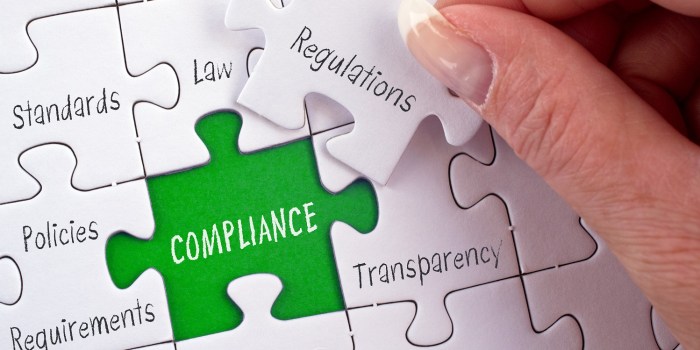Online Business Compliance sets the stage for digital entrepreneurs to thrive by understanding and adhering to crucial legal standards. From data protection to customer trust, let’s explore the key aspects of compliance in the online realm.
As we dive deeper, we’ll uncover the significance of legal requirements, key regulations like GDPR and COPPA, implementing compliance measures, and the tools/resources necessary for a compliant online business.
Importance of Online Business Compliance

Online business compliance is crucial for ensuring that businesses operate within legal boundaries and regulations in the digital space. It helps protect both the business and its customers, establishing trust and credibility.
Legal Requirements for Online Businesses
- Privacy Policies: Online businesses must have clear and transparent privacy policies outlining how customer data is collected, used, and protected.
- Terms of Service: Clearly defined terms of service help set expectations for customers regarding product/service delivery, refunds, and other important aspects of the business relationship.
- GDPR Compliance: Businesses operating in the European Union must comply with the General Data Protection Regulation (GDPR) to protect the personal data of EU citizens.
Consequences of Non-Compliance
- Legal Penalties: Non-compliance with regulatory requirements can result in fines, lawsuits, and even business shutdowns.
- Data Breaches: Failure to protect customer data can lead to data breaches, damaging the business’s reputation and customer trust.
- Loss of Customers: Customers are more likely to trust and engage with businesses that demonstrate compliance, so non-compliance can lead to a loss of customer trust and loyalty.
Building Trust with Customers
- Transparency: Compliance shows customers that the business is transparent and respects their rights, fostering trust and loyalty.
- Security: Taking measures to comply with data protection regulations assures customers that their data is safe and secure with the business.
- Reputation: A compliant business builds a positive reputation in the market, attracting more customers and increasing brand value.
Key Regulations for Online Businesses
In today’s digital world, online businesses must adhere to various regulations to ensure compliance and protect both their customers and their reputation.
GDPR and Its Implications
The General Data Protection Regulation (GDPR) is a comprehensive data privacy law that affects how businesses collect, store, and process personal data of individuals in the European Union. It requires businesses to obtain explicit consent for data collection, provide transparency on data usage, and implement robust security measures to protect sensitive information.
COPPA Impact on Businesses
The Children’s Online Privacy Protection Act (COPPA) regulates the online collection of personal information from children under the age of 13. Businesses targeting children online must obtain parental consent before collecting any data, provide clear privacy policies, and take necessary steps to safeguard children’s information.
Importance of PCI DSS Compliance
The Payment Card Industry Data Security Standard (PCI DSS) is a set of security standards designed to ensure the safe handling of credit card information during online transactions. Compliance with PCI DSS helps businesses prevent data breaches, protect customer payment data, and build trust with their online customers.
Implementing Compliance Measures: Online Business Compliance

To ensure that your online business is compliant with regulations, it is crucial to implement specific measures. These measures include steps to ensure data protection compliance, strategies for maintaining website compliance, the role of privacy policies and terms of service agreements, and conducting regular compliance audits.
Steps to Ensure Data Protection Compliance
- Encrypt sensitive data: Utilize encryption methods to protect customer information and sensitive data from unauthorized access.
- Implement access controls: Limit access to data based on job roles and responsibilities within your organization.
- Regularly update security measures: Stay current with security software updates and patches to address any vulnerabilities.
- Train employees: Provide training on data protection practices and security protocols to ensure all staff members are aware of compliance requirements.
Strategies for Maintaining Website Compliance
- Regularly review and update policies: Ensure that your privacy policies and terms of service agreements are up to date and reflect any changes in regulations.
- Monitor third-party services: Keep track of any external services or plugins used on your website to ensure they also comply with regulations.
- Seek legal advice: Consult with legal professionals to ensure that your website and business practices adhere to all relevant laws and regulations.
Role of Privacy Policies and Terms of Service Agreements
- Privacy policies: Clearly Artikel how you collect, use, and protect customer data on your website, providing transparency to users about their information.
- Terms of service agreements: Establish the rules and guidelines that users must follow when using your website, setting expectations and responsibilities for both parties.
Conducting Regular Compliance Audits
- Establish a schedule: Set up a regular timetable for conducting compliance audits to ensure that your business remains up to date with regulations.
- Review processes and procedures: Evaluate your current practices to identify any areas that may pose compliance risks and address them accordingly.
- Document findings: Keep detailed records of your compliance audits and any actions taken to rectify non-compliance issues.
Tools and Resources for Online Business Compliance
Implementing compliance measures is crucial for the success and longevity of online businesses. To streamline this process, businesses can leverage various tools and resources to ensure they are meeting regulatory requirements effectively. Let’s explore some key tools and resources that can help businesses with online compliance:
Software Tools for Automating Compliance Processes, Online Business Compliance
- Compliance management software: Platforms like ZenGRC, LogicGate, and ComplianceLine offer automated solutions for tracking, monitoring, and managing compliance tasks.
- Document management systems: Tools like SharePoint, Google Drive, and Dropbox help businesses organize and store compliance-related documents securely.
- Risk assessment software: Platforms such as Resolver and Riskonnect assist businesses in identifying and mitigating compliance risks proactively.
Role of Compliance Management Platforms
- Centralized compliance tracking: Compliance management platforms provide a centralized system for tracking compliance activities, deadlines, and audit trails.
- Automated reporting: These platforms generate real-time reports on compliance status, performance metrics, and areas for improvement.
- Integration capabilities: Compliance management platforms can integrate with other business systems to streamline compliance processes across departments.
Leveraging Industry Guides and Resources
- Industry-specific guidelines: Businesses can refer to industry guides published by regulatory bodies or associations to stay updated on compliance requirements relevant to their sector.
- Training materials: Resources like webinars, online courses, and whitepapers offer valuable insights into compliance best practices and regulatory changes.
Importance of Training Employees on Compliance Best Practices
- Enhanced awareness: Training employees on compliance best practices helps create a culture of compliance within the organization, reducing the risk of violations.
- Improved efficiency: Educated employees are better equipped to adhere to compliance standards, leading to smoother operations and reduced compliance-related issues.
- Reduced liabilities: Training employees on compliance helps mitigate legal risks and potential fines associated with non-compliance.
